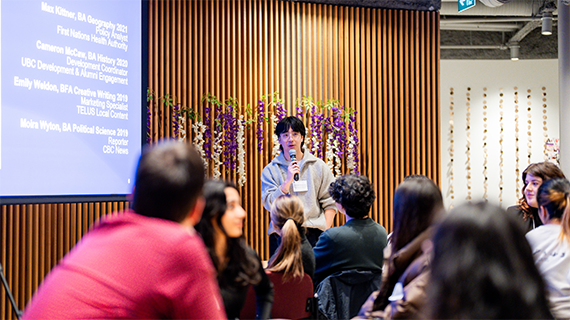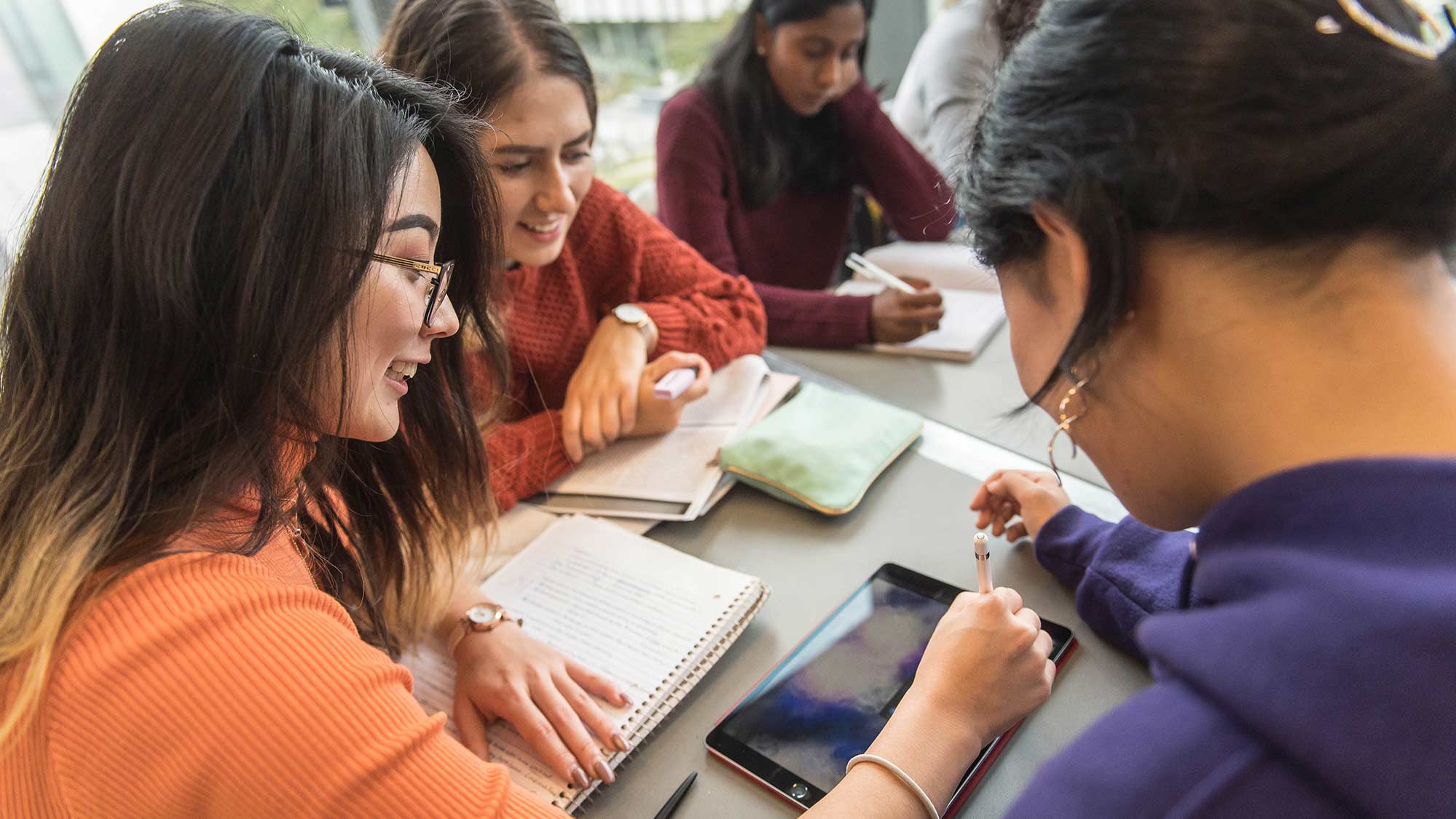To kick off our 2019/20 student stories, ASA has interviewed three 2nd year students who share their experience about moving from home, forming friendships, joining Indigenous community and bonding over skateboarding. Dene, Summer and Tori are amazing young Indigenous students from different backgrounds and places that have come together to create their own Indigenous skate group 3sistersskate. You can follow their Instagram page @3sisterskate!
Story produced by ASA Peer Advisor, Tiana Bone
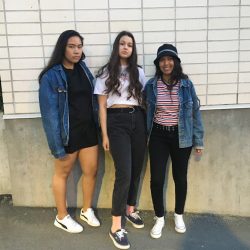

Aniin Boozhoo (hello) Summer Tyance, is an Anishinaabekwe originally from Gull Bay First Nation but grew up in Thunder Bay, Ontario. She plans to major in First Nations and Indigenous Studies, and minor in Political Science. Summer’s future goal is to obtain a law degree and to practice Indigenous-related law.
Oki Niisto Nitanko (Hello, my name is…) Tori Chief Calf is Blackfoot from the Blood Tribe located in what is now southern Alberta. Currently, she is studying and hopes to attain a degree in Gender, Race, Sexuality and Social Justice (GRSJ); she also hopes to minor in Film Studies.
1. The three of you formed a skate group and have a page up on Instagram (@3sisterskate), how did this idea come up? (Share as much as you want about the idea/purpose/goals)
S: I really want to recognize Tori as the original skater in our friend group. Skateboarding is something that I always wanted to learn, but was too afraid of the stigma, gender roles, and the hard (sometimes painful) practice that comes along with it. Dene was the second one to buy a skateboard, and when the two of them started skating together I soon wanted to learn and be part of this new community too. They slowly helped me learn the basics and I was following along and skating with them in no time.
D: I used to longboard and penny board at home, but never really got into it. One day we went to the skate park with Tori’s board and we were riding around and she taught me how to ollie. I knew I wanted to skate after that, so I bought a board and we started skating more often. I gave Summer my penny board so we could all cruise around together.
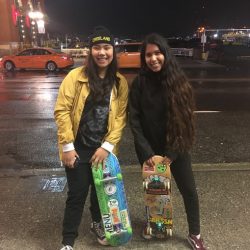

D: We thought an Instagram account would be perfect to stay connected and share our progress. Our Instagram has also introduced us to the larger skate community in Vancouver and we’re super excited to get back into it. We are always looking for people to skate with, so hit us up if you’re ever looking to skate or looking try it out!
S: The name “3sistersskate” was formed when we deemed our friend group as the three sisters (corn, beans, & squash) which is an Indigenous agricultural staple. We all need each other in our own ways and we all have been growing together just like these plants.
2. What was it like transitioning to life at UBC as out of province students?
D: It was pretty tough at times being away from my family and my home, and it was a major adjustment. I did get homesick many times, but I’m glad I had made a solid group of friends who have become my family in Vancouver.
T: I participated in a first year orientation called JumpStart and made lots of friends there which made things feel a little less lonely. As time progressed though, I found myself getting homesick— wanting to be back in the slow paced environment of my hometown – but facetiming my family alleviated some of those feelings. I also just tried my best to involve myself on campus and spend time with my friends who are now like a second family to me.
S: Personally, the transition wasn’t too difficult as I waited eagerly to graduate high school, move away for university, and start my next journey. That being said, I was always very independent but I did get homesick from time to time, usually missing my family more than anything. I was shy in the beginning of the semester like any new student, but I am so grateful to have met two of my closest friends at Destination UBC in late April before starting at UBC.
3. You are all involved with Indigenous communities on campus (Indigenous Leadership Collective, the Longhouse, Indigenous Committee, etc). Do you have any advice about creating space, community and connections for incoming/current Indigenous students at UBC?
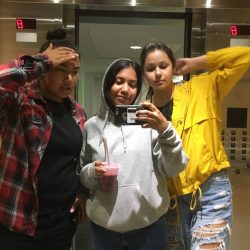

S: Meeting like-minded Indigenous students and getting introduced to the Longhouse right away was exactly what I needed to make UBC really feel like a second home. My advice would be to not wait or hesitate! I know the nerves that come along with being a first year and fears of joining clubs and other groups, but I can assure you that you are not alone and that everyone is trying to make new friends, community and find their own space. UBC is so welcoming and accepting; especially everyone at the Longhouse.
T: A big part of why I wanted to come to UBC was because of the presence of many Indigenous communities/ support on campus which I thought would help bring a sense of belonging (which it did). I loved making friends within these communities and being a part of something that was just for Indigenous students. That support is crucial, especially for many students who come from smaller communities. The Talking Stick and weekly announcements at the Longhouse are great examples of connecting students to different spaces and communities for Indigenous students.
4. How do you all stay connected to your culture while at UBC?
T: While at school, I try my best to involve myself in as many Indigenous centered activities/ events and groups as I can, to not only keep that sense of belonging but to connect with other students and talk about things that we can relate on. I also try my best to smudge to begin and end off the week (a ceremonial practice), praying to creator for a good week and meditating on any events or emotions that have been weighing on me for that week. It’s very special to me to keep this practice, as I also say a Blackfoot prayer that I had learned in school so that I can keep that close connection to my roots—even if it is for a couple times a week.
S: The Longhouse is always offering really interesting events, guest speakers, Tuesday lunches and cultural programs that I often try to go to as much as I can. It was here where I discovered the Indigenous Leadership Collective from fellow Arts peers. Later in the year I also found myself joining the Indigenous Committee so I could be more involved in events, ideas, and programs that were being organized for and by Indigenous students.
D: At home my mom would always light a smudge in the morning if we needed a good day or a cleanse so I do the same living in Vancouver. I also am a part of a women’s hand drum called Indigenous Women Rise, and that’s always one of the highlights of my week.
S: Dene Petti and I started taking cultural language classes held by Pacific Association of First Nations Women at the Native Education College. It was through these classes that we discovered many more of the traditional workshops, classes and programs that PAFNW ran. We soon became a part of the Indigenous Women Rise hand drum group and attended almost every Tuesday we could. If the Longhouse or any other Indigenous UBC club / committee ever created a drum group I would absolutely love to join or see the growth of more diverse Indigenous activities!
5. Who inspires you to be better?
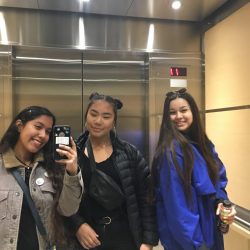

D: All the women in my family inspire me. I know how hard they’ve worked to get to where they are, and they inspire me to put in the same work to keep creating better futures for the next generations. I’m so thankful to be raised surrounded by strong women, like my mom, setsune, my kookums, and my sisters, and I do my best to make them proud.
T: For the most part, my grandma and my great aunt who have both passed on to the spirit world. They were two of my biggest supporters in my life and I know that they continue to root for me. As accomplished scholars, they inspire me to continue working hard to achieve my goals and aspirations— to give my all and remind me of the importance to be generous and kind-hearted as they both were.
